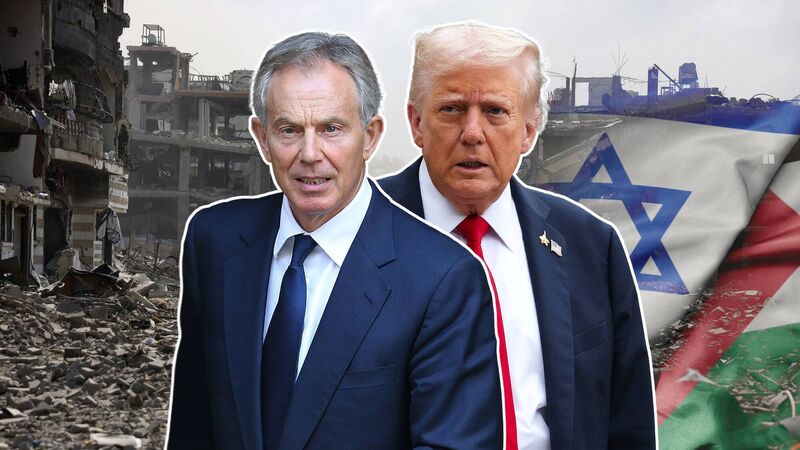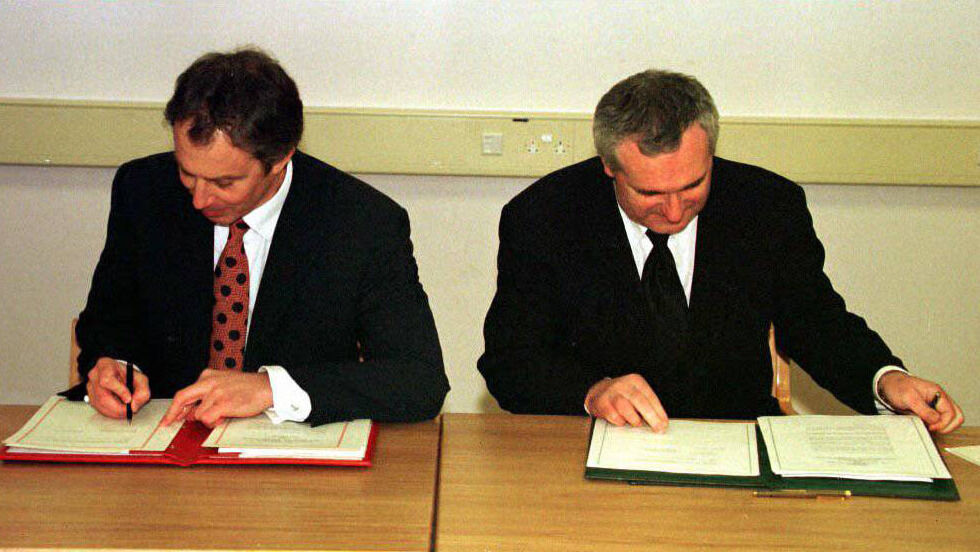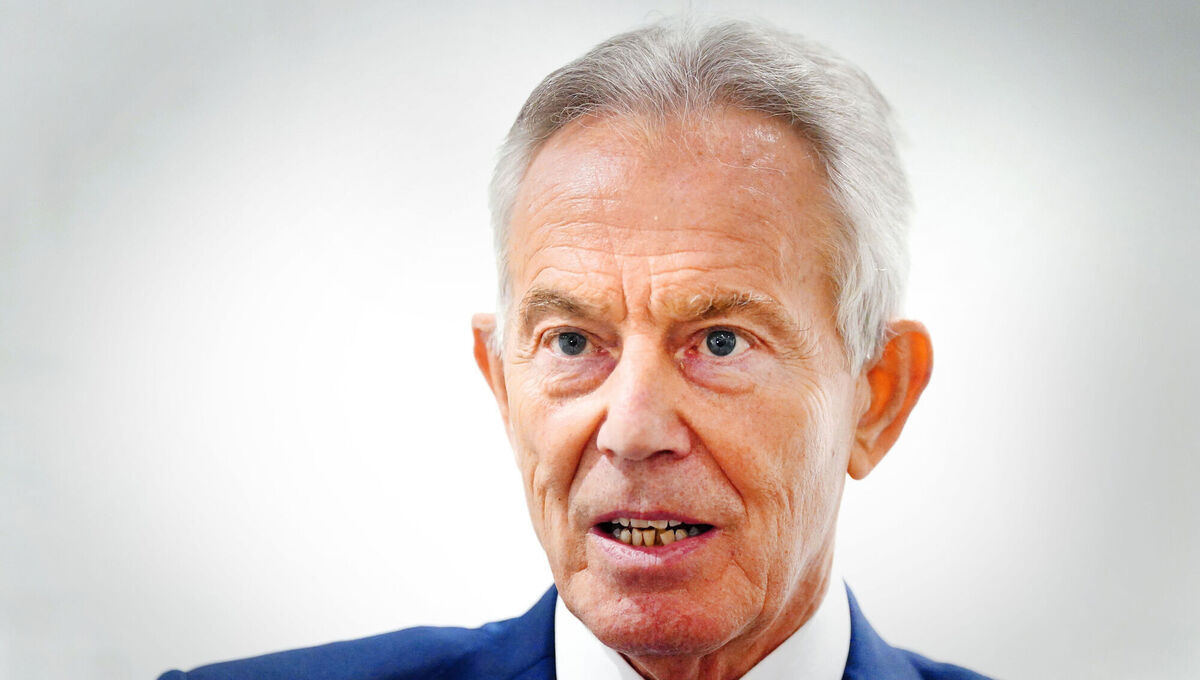Tony Blair set for political comeback in Trump’s Gaza peace plan — but ghosts of Iraq still linger

Donald Trump is bringing Tony Blair on board for his peace plan. Picture: Eric Draper/AP
In political terms, he was once the king of rock ‘n’ roll, owning the stage all the way until the music died horribly. Now, Tony Blair may well be back for his swan song.
The former British prime minister is being touted to have a central role in the future of Gaza. He turned up this week in Donald Trump’s 20-point peace plan.
Once hostages and military withdrawals are all sorted under the putative plan, a rebuilding will have to take place overseen by an international board.
Trump is going to head up this board himself, but one of the key personnel will be Blair. In the unlikely, but hoped-for, event that it all comes to pass, there is no surer thing than that Trump will lose interest and so Blair would almost definitely take his place.
“He’s a good man, a very good man,” Trump said of Blair last Monday as he presented the plan in the company of Benjamin Netanyahu, who is subject to an arrest warrant from the International Criminal Court (ICC) for alleged war crimes and crimes against humanity.
The elevation of the 72-year-old elder statesman to a central role will come as no surprise to anybody who has been watching the diplomatic manoeuvres at the edge of the unfolding genocide in Gaza.
Blair has been working in recent months with Trump’s son-in-law, Jared Kushner, and advisers in both the American and Israeli administrations. He quite obviously wants to bring an end to the slaughter. It would be churlish to suggest that he is operating from anything but the most selfless motives in this respect.
For it was in the Middle East that he made what many have described as the catastrophic error, to put it charitably, that forever tarnished his legacy.
In 2003, Blair stood shoulder to shoulder with US president George W Bush in declaring war on Iraq — setting off something that would reverberate across the world and down through the decades since.
The premise for going to war — that Saddam Hussein had access to weapons of mass destruction (WMD) — was dodgy. Blair and his spokesman, Alastair Campbell, were accused of “sexing up” a dossier that was inconclusive as to whether such weapons were present. To a large constituency in Britain, and beyond, Blair is categorised as a “war criminal” for how he conducted himself — though he has never faced charges of war crimes.
Others are more charitable but, despite his long-held firm position that he acted entirely correctly and proportionately, it’s difficult to believe he does not harbour major regrets about the whole thing.
It was all so different six years earlier when he ushered in “cool Britannia” with a landslide election victory in May 1997.
“A new dawn has broken, has it not,” he said on the morning after victory.
He had, over the previous three years, modernised a Labour Party that had fallen out of favour with the British electorate. Enter New Labour. With Campbell, and others such as Peter Mandelson, he brought the party in from the left.
In doing so, he called for a “radical shift in our values and attitudes”. He said that the welfare state, long associated with the old Labour Party, had to change along with the times. England felt comfortable with it.
After 18 years in power, the Tories were looking tired and not a little corrupted by power. Blair injected energy and hope. He invited to Downing St the Gallagher brothers and various other standard bearers of the emerging “cool Britannia”. And off he went to reshape his country.
The welfare state would have to change. He emphasised “education, education, education”. He promised to be “tough on crime, tough on the causes of crime”.

The economy boomed as Britain benefitted from the fruits of globalisation.
Money was poured into education at all levels, but Blair’s chancellor Gordon Brown kept a tight grip on the public purse. Their predecessors in Labour had long been accused, often with justification, of burning holes in the public purse. This time they were going to make it work.
Another landslide victory followed in 2001. After that, the purse strings were loosened somewhat on the back of bulging corporate profits. The health system improved and greater outcomes were being recorded in education.
The Blair years were going swimmingly. He put the shoulder to the wheel on the efforts to bring violence to an end in Northern Ireland.
“So much shared history, so much shared pain,” he said in an address to the Oireachtas in 1998.
“And now the shared hope of a new beginning.”
A good relationship formed with Bertie Ahern, whose recent election bore similarities to Blair’s, and a genuine commitment to invest time in the issue culminated with the Good Friday Agreement.
Ahern deserves the major plaudits for his role, but Blair isn’t far behind him.
That, however, was nothing compared to his position on Iraq.
After 9/11 and the defeat of the Taliban, George W Bush had some daddy issues to deal with.
His father, as president, had chased Saddam Hussein from Kuwait in 1991, but left him in-situ in Iraq. Daddy’s main men, Dick Cheney and Donald Rumsfeld, were now whispering in W’s ear: “Let’s get the critter.”
Blair was determined to stand shoulder to shoulder with the Americans. What he needed was a good reason to bring Britain into the war, even though most European allies were staying out.
Right through his tenure, Blair and right-hand man Campbell were often accused of elevating spin over substance. They both saw themselves in perennial combat with a largely pro-Tory press.
They believed that the messaging was vital to their political project.
Then came the infamous dossier on weapons of mass destruction compiled within the British security services.
Without this affirming that Hussein was a threat to world security, Blair would not be in a position to put British lives on the line.
No inquiry since has ever stated that lies were told on foot of this report, but the term “sexing up” has long been associated with it.
Pressure was also applied to some who were tasked with assessing the threat. David Kelly, who came under enormous strain, took his own life.

Ultimately, Blair determined that the report was enough to go to the House of Commons looking for a declaration to join the war. It is often forgotten that parliament gave him the nod.
It is not forgotten that what appears to be a determination to go to war as a US ally came from a man who, six years earlier on his election, had claimed: “Mine is the first generation able to contemplate the possibility that we may live our entire lives without going to war or sending our children to war.”
Yet, he did send young men and women to war. And it was to turn out that the premise for doing so was completely false.
Hussein had no weapons of mass destruction. Blair has always claimed he acted in good faith, but ultimately a sense of betrayal set in with large swathes of the population.
He won his third general election in 2005, in the shadow of the slow grind towards the long-term result of the war. Two years later, he quit because it was becoming apparent his popularity was irrecoverable.
Francis Beckett, co-author of , last week told reporters that the Iraq war was the turning point in Blair’s premiership.
“It’s not just that every year that passes since the Iraq invasion we see more evil results from it, but also it was the way it was done … The fact that he acquiesced in an invasion without any consideration for the future governance of the country began his descent to the point where his resignation as prime minister in 2007 became inevitable, because it was very clear that he could not win another general election.”
He did some public work, including a stint as an envoy to the Middle East.
Over that period his reputation has not recovered. He quite obviously would like to make some contribution to bringing peace, but a question hangs over his credibility.
In 2003, he entered the war in Iraq in concert with his friend Bush. The emergence of Trump has cast Bush in relatively favourable retrospective light.
Now, another American president is looking for Blair’s assistance. A question immediately arises as to whether he can trust Trump, whether anybody associated with the Middle East can.
However, all the indications are that Tony Blair is willing to step up to the plate, to serve. If he gets the chance, it will be interesting to see how he handles this one.





